I have a get call to a rest service (that works fine), and I would like to change it and use jersey.
I downloaded the last JARs from the official site and put them inside my project.
All my response thrown exceptions (except this: String response = invocationBuilder.get(String.class);):
javax.ws.rs.NotAcceptableException: HTTP 406 Not Acceptable
at org.glassfish.jersey.client.JerseyInvocation.convertToException(JerseyInvocation.java:1014)
at org.glassfish.jersey.client.JerseyInvocation.translate(JerseyInvocation.java:816)
at org.glassfish.jersey.client.JerseyInvocation.access$700(JerseyInvocation.java:92)
at org.glassfish.jersey.client.JerseyInvocation$2.call(JerseyInvocation.java:700)
at org.glassfish.jersey.internal.Errors.process(Errors.java:315)
at org.glassfish.jersey.internal.Errors.process(Errors.java:297)
at org.glassfish.jersey.internal.Errors.process(Errors.java:228)
at org.glassfish.jersey.process.internal.RequestScope.runInScope(RequestScope.java:444)
at org.glassfish.jersey.client.JerseyInvocation.invoke(JerseyInvocation.java:696)
at org.glassfish.jersey.client.JerseyInvocation$Builder.method(JerseyInvocation.java:420)
at org.glassfish.jersey.client.JerseyInvocation$Builder.get(JerseyInvocation.java:316)
The code:
ClientConfig clientConfig = new ClientConfig();
Client client = ClientBuilder.newClient(clientConfig);
//not so orthodox...
WebTarget webTarget = client.target(uri);//uri= https://www.foo.bar/api/v1.0/sms/sendMessage?accessKeyId=34TR&idCampaign=4&fromNumber=Test&toNumber=393281234567&message=Inserisci+la+seguente+password%3A+8c495b
Invocation.Builder invocationBuilder2 =
webTarget.request(MediaType.APPLICATION_JSON);
Invocation.Builder invocationBuilder =
webTarget.request();//------NO MEDIA TYPE SPECIFICATION
Invocation.Builder invocationBuilder3 =
webTarget.request(MediaType.APPLICATION_XML_TYPE);
Invocation.Builder invocationBuilder4 =
webTarget.request(MediaType.TEXT_XML_TYPE);
Invocation.Builder invocationBuilder5 =
webTarget.request(MediaType.TEXT_PLAIN_TYPE);
Invocation.Builder invocationBuilder6 =
webTarget.request(MediaType.APPLICATION_FORM_URLENCODED);
try {
String response2 = invocationBuilder2.get(String.class);
} catch (Exception e) {System.out.println(e);}
try {
//WORKS ONLY THIS, WITH NO MEDIA TYPE SPECIFICATION
String response = invocationBuilder.get(String.class);
} catch (Exception e) {System.out.println(e);}
try {
String response3 = invocationBuilder3.get(String.class);
} catch (Exception e) {System.out.println(e);}
try {
String response4 = invocationBuilder4.get(String.class);
} catch (Exception e) {System.out.println(e);}
try {
String response5 = invocationBuilder5.get(String.class);
} catch (Exception e) {System.out.println(e);}
try {
String response6 = invocationBuilder6.get(String.class);
} catch (Exception e) {System.out.println(e);}
//NONE OF THIS WORKS (last part of the test):
try {
SmsResponse response02 = invocationBuilder2.get(SmsResponse.class);
} catch (Exception e) {System.out.println(e);}
try {
SmsResponse response0 = invocationBuilder.get(SmsResponse.class);
} catch (Exception e) {System.out.println(e);}
try {
SmsResponse response03 = invocationBuilder3.get(SmsResponse.class);
} catch (Exception e) {System.out.println(e);}
try {
SmsResponse response04 = invocationBuilder4.get(SmsResponse.class);
} catch (Exception e) {System.out.println(e);}
try {
SmsResponse response05 = invocationBuilder5.get(SmsResponse.class);
} catch (Exception e) {System.out.println(e);}
try {
SmsResponse response06 = invocationBuilder6.get(SmsResponse.class);
} catch (Exception e) {System.out.println(e);}
The response string is a JSON: {"status":"success","uid":"407077","numSms":1,"errorMsg":false}
But I get an exception while trying to obtain a SmsResponse object (last part of code), response0 thrown the exception below (the other cases thrown the previous 406 exception):
org.glassfish.jersey.message.internal.MessageBodyProviderNotFoundException: MessageBodyReader not found for media type=application/json;charset=UTF-8, type=class it.sian.zfab.SmsResponse, genericType=class it.sian.zfab.SmsResponse.
at org.glassfish.jersey.client.JerseyInvocation.translate(JerseyInvocation.java:808)
at org.glassfish.jersey.client.JerseyInvocation.access$700(JerseyInvocation.java:92)
at org.glassfish.jersey.client.JerseyInvocation$2.call(JerseyInvocation.java:700)
at org.glassfish.jersey.internal.Errors.process(Errors.java:315)
at org.glassfish.jersey.internal.Errors.process(Errors.java:297)
at org.glassfish.jersey.internal.Errors.process(Errors.java:228)
at org.glassfish.jersey.process.internal.RequestScope.runInScope(RequestScope.java:444)
at org.glassfish.jersey.client.JerseyInvocation.invoke(JerseyInvocation.java:696)
at org.glassfish.jersey.client.JerseyInvocation$Builder.method(JerseyInvocation.java:420)
at org.glassfish.jersey.client.JerseyInvocation$Builder.get(JerseyInvocation.java:316)
The bean:
@XmlRootElement
public class SmsResponse implements Serializable {
private static final long serialVersionUID = 1L;
@QueryParam("uid")
private String uid;
@QueryParam("status")
private String status;
@QueryParam("errorMsg")
private String errorMsg;
@QueryParam("numSms")
private Integer numSms;
//getter and setter...
}
My old method (that works), here you can see that it's working fine with content application/json:
private <T> T restCallJson(String uri, Class<T> returnType)
{
T objectResponse = null;
try {
URL url = new URL(uri);
HttpsURLConnection connection = (HttpsURLConnection)url.openConnection();
connection.setRequestMethod("GET");
connection.setRequestProperty("Content-Type", "application/json");
InputStream inputStream = connection.getInputStream();
Gson gson = new Gson();
final BufferedReader reader = new BufferedReader(new InputStreamReader(inputStream));
objectResponse = gson.fromJson(reader, returnType);
connection.disconnect();
}
catch (Exception e)
{
log.error("WebServiceUtility - restCallJson: " + e);
}
return objectResponse;
}
1) Why cannot I specify the MediaType? Which one should I use?
2) Why cannot I retrieve directly the SmsResponse object?

Not Acceptable
An appropriate representation of the requested resource /api/v1.0/sms/sendMessage could not be found on this server.
Available variants:Apache/2.2.15 (CentOS) Server at www.foo.bar Port 443 ` – Accollativo Oct 19 '15 at 13:47